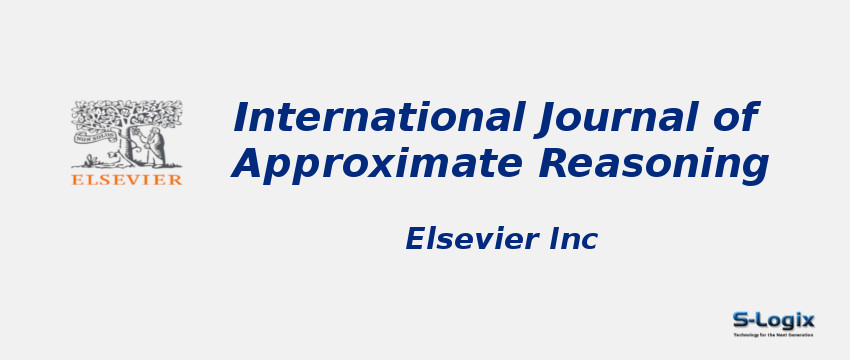The International Journal of Approximate Reasoning aims to provide a platform for researchers, practitioners, and educators to publish original research articles, reviews, and application papers that advance the field of approximate reasoning. By promoting interdisciplinary research and collaboration, the journal contributes to the development of robust and effective techniques for handling uncertainty and imprecision in decision-making and problem-solving scenarios.
Objective:
The primary objective of the International Journal of Approximate Reasoning is to foster research and innovation in approximate reasoning methods and applications. The journal seeks to publish high-quality articles that present novel contributions to the theory, algorithms, and applications of approximate reasoning. Topics of interest include fuzzy logic, rough sets, probabilistic reasoning, belief functions, neural networks, evolutionary computing, and hybrid intelligent systems. The journal aims to bridge the gap between theoretical advancements and practical applications by providing a platform for researchers and practitioners to explore new methodologies, discuss emerging trends, and disseminate best practices in handling uncertainty and imprecision.
Interdisciplinary Approach:
The International Journal of Approximate Reasoning adopts an interdisciplinary approach, welcoming contributions that integrate approximate reasoning research with related fields such as artificial intelligence, machine learning, data science, decision support systems, and cognitive science. The journal covers diverse interdisciplinary topics such as fuzzy systems for control and optimization, uncertain reasoning in medical diagnosis, approximate reasoning in robotics and automation, and applications of probabilistic reasoning in engineering and finance. By embracing a multidisciplinary perspective, the journal encourages collaboration and innovation at the intersection of approximate reasoning techniques and other scientific and engineering disciplines, addressing complex challenges and advancing state-of-the-art solutions.
Impact:
The impact of the International Journal of Approximate Reasoning is significant in both academic research and practical applications. By publishing rigorous research articles, reviews, and application papers, the journal contributes to the advancement of approximate reasoning methodologies, algorithms, and systems. The journals publications inform the development of new techniques for uncertainty modeling, decision support under imprecision, and intelligent systems capable of handling real-world complexities. The emphasis on high-quality research and practical relevance ensures that the journals contributions support the development of robust, efficient, and interpretable solutions for decision-making and problem-solving in uncertain environments.
Significance:
The International Journal of Approximate Reasoning holds significant importance for researchers, educators, practitioners, and policymakers involved in artificial intelligence, decision support systems, and uncertainty management. The journals contributions include advancing theoretical frameworks, exploring new applications of approximate reasoning techniques, and addressing practical challenges in decision-making under uncertainty. By providing insights into the latest developments, trends, and best practices in approximate reasoning, the journal serves as a valuable resource for understanding the capabilities and limitations of current approaches to handling uncertainty. It supports the continuous evolution and adoption of approximate reasoning techniques, contributing to the advancement of knowledge and innovation in the field of intelligent systems and decision science.
Journal Home: Journal Homepage
Editor-in-Chief: Thierry Denoeux
scope:
The International Journal of Approximate Reasoning is a peer-reviewed journal that focuses on theories, methodologies, and applications of approximate reasoning. Approximate reasoning techniques are essential in handling uncertainty, imprecision, and incomplete information in decision-making processes. The journal covers a wide range of topics related to approximate reasoning, including:
Fuzzy Logic:
Theory and applications of fuzzy sets, fuzzy logic systems, fuzzy inference, fuzzy control, and fuzzy decision-making.
Probabilistic Reasoning:
Methods for probabilistic reasoning, Bayesian networks, belief networks, probabilistic graphical models, and applications in uncertainty modeling.
Rough Sets:
Theory and applications of rough set theory, rough mereology, rough-fuzzy hybridization, rough clustering, and rough computing.
Interval and Imprecise Reasoning:
Techniques for handling interval uncertainty, imprecise probabilities, Dempster-Shafer theory, possibility theory, and applications in decision support systems.
Soft Computing:
Integration of approximate reasoning with other soft computing techniques, such as neural networks, evolutionary computation, and swarm intelligence.
Machine Learning:
Applications of approximate reasoning in machine learning algorithms, including pattern recognition, classification, regression, and data mining.
Decision Support Systems:
Development and evaluation of decision support systems based on approximate reasoning methods, including expert systems and knowledge-based systems.
Multi-criteria Decision Making:
Approaches for multi-criteria decision-making under uncertainty, including utility theory, risk analysis, and preference modeling.
Applications in Engineering and Sciences:
Practical applications of approximate reasoning in engineering disciplines (such as control systems, robotics, and image processing) and sciences (such as biology, medicine, and environmental studies).
Philosophical and Methodological Foundations:
Foundational studies on approximate reasoning, philosophical aspects, methodological developments, and comparative studies of different approximate reasoning paradigms.
Evaluation and Benchmarking:
Methods for evaluating and benchmarking approximate reasoning techniques, including performance metrics, case studies, and real-world applications.
Print ISSN: 0888-613X
Electronic ISSN: 1873-4731
Abstracting and Indexing: Science Citation Index Expanded, Scopus.
Imapct Factor 2023: 3.2
Subject Area and Category: Computer Sciences, Mathematics
Publication Frequency: Bimonthly
H Index: 112
Q1: Applied Mathematics
Q2:
Q3:
Q4:
Cite Score: 6.9
SNIP: 1.5
Journal Rank(SJR): 0.877
Latest Articles: Latest Articles in International Journal of Approximate Reasoning
Guidelines for Authors: International Journal of Approximate Reasoning Author Guidelines
Paper Submissions: Paper Submissions in International Journal of Approximate Reasoning
Publisher: Elsevier Science
Country: United States
